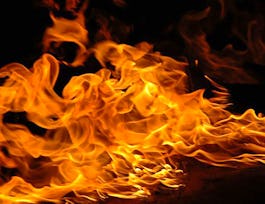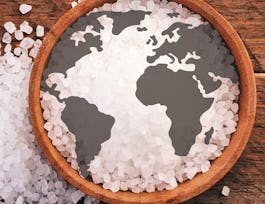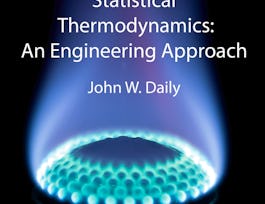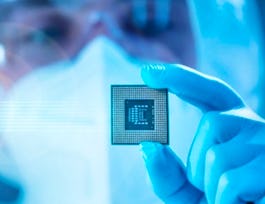Course 3 of Statistical Thermodynamics, Ideal Gases, explores the behavior of systems when intermolecular forces are not important. This done by evaluating the appropriate partition functions for translational, rotational, vibrational and/or electronic motion. We start with pure ideal gases including monatomic, diatomic and polyatomic species. We then discuss both non-reacting and reacting ideal gas mixtures as both have many industrial applications. Computational methods for calculating equilibrium properties are introduced. We also discuss practical sources of ideal gas properties. Interestingly, in addition to normal low density gases, photons and electrons in metals can be described as though they are ideal gases and so we discuss them.


Ideal Gases
This course is part of Statistical Thermodynamics Specialization
Taught in English
Some content may not be translated

Instructor: John W. Daily
6,094 already enrolled
Included with 
Course
(139 reviews)
What you'll learn
Analyze the behavior of monatomic, diatomic, and polyatomic ideal gases under various conditions
Describe the distinction between pure ideal gases and ideal gas mixtures and their industrial applications
Identify the key components of the partition functions used to describe translational, rotational, vibrational, and electronic motion
Skills you'll gain
Details to know

Add to your LinkedIn profile
5 quizzes
Course
(139 reviews)
See how employees at top companies are mastering in-demand skills

Build your subject-matter expertise
- Learn new concepts from industry experts
- Gain a foundational understanding of a subject or tool
- Develop job-relevant skills with hands-on projects
- Earn a shareable career certificate


Earn a career certificate
Add this credential to your LinkedIn profile, resume, or CV
Share it on social media and in your performance review

There are 3 modules in this course
Module 1 starts an exploration of systems for which intermolecular forces are not important. This is done by evaluating the appropriate partition functions for translational, rotational, vibrational and/or electronic motion. In this module we explore pure ideal gases including monatomic, diatomic and polyatomic species. We also explore literature sources of properties and empirical estimation methods.
What's included
5 videos5 readings4 quizzes3 discussion prompts
In Module 2 we discuss both non-reacting and reacting ideal gas mixtures as both have many industrial applications. Computational methods for calculating equilibrium properties are introduced.
What's included
3 videos3 readings3 discussion prompts
Interestingly, in addition to normal low density gases, photons and electrons in metals can be described as though they are ideal gases and so we discuss them.
What's included
2 videos2 readings1 quiz1 discussion prompt
Instructor

Offered by
Recommended if you're interested in Mechanical Engineering

University of Colorado Boulder

Johns Hopkins University

University of Colorado Boulder

Arizona State University
Why people choose Coursera for their career




Learner reviews
Showing 3 of 139
139 reviews
- 5 stars
68.34%
- 4 stars
23.74%
- 3 stars
3.59%
- 2 stars
0.71%
- 1 star
3.59%

Open new doors with Coursera Plus
Unlimited access to 7,000+ world-class courses, hands-on projects, and job-ready certificate programs - all included in your subscription
Advance your career with an online degree
Earn a degree from world-class universities - 100% online
Join over 3,400 global companies that choose Coursera for Business
Upskill your employees to excel in the digital economy
Frequently asked questions
Access to lectures and assignments depends on your type of enrollment. If you take a course in audit mode, you will be able to see most course materials for free. To access graded assignments and to earn a Certificate, you will need to purchase the Certificate experience, during or after your audit. If you don't see the audit option:
The course may not offer an audit option. You can try a Free Trial instead, or apply for Financial Aid.
The course may offer 'Full Course, No Certificate' instead. This option lets you see all course materials, submit required assessments, and get a final grade. This also means that you will not be able to purchase a Certificate experience.
When you enroll in the course, you get access to all of the courses in the Specialization, and you earn a certificate when you complete the work. Your electronic Certificate will be added to your Accomplishments page - from there, you can print your Certificate or add it to your LinkedIn profile. If you only want to read and view the course content, you can audit the course for free.
If you subscribed, you get a 7-day free trial during which you can cancel at no penalty. After that, we don’t give refunds, but you can cancel your subscription at any time. See our full refund policy.

